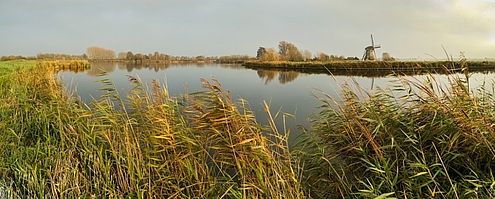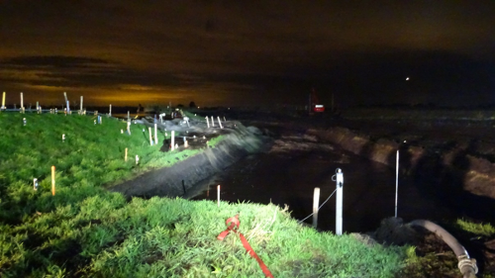Dykes and Embankments
This new research theme is being developed with the aim of bridging fundamental research on materials, processes and structures with the societal needs of construction, maintenance and safety of the national and international infrastructures. The present focus is the Dutch water system and European research lines on transport and climate action. Deltaic areas are specially addressed.
The research is characterised by a strong multi-disciplinary approach, involving hydraulic, mechanical and biochemical processes, and by a wide spectrum of methodologies, including experimental research on materials and models, theoretical developments on materials and structure behaviour, and numerical modelling of soil-structure interaction under lifetime and exceptional loads. (Example: Leendert de Boerspolder, see personal page Cristina Jommi)
There is collaboration with Geophysics for non-invasive studies, the GRS department for exploiting satellite data, and the HE department for innovative monitoring techniques. Research initiatives are starting with the section of Road Engineering on transportation infrastructures, and with the universities of Utrecht, Wageningen and Twente, to address fundamental research on the relevant coupled physical processes. A close working relationship with STOWA and the Dutch water boards and provinces has been developed.
Leendert de Boerspolder
On October 14, 2015 the Geo-Engineering section has made headlines by successfully failing a rural dyke in the Leendert de Boerspolder.

The Leendert de Boerspolder environment, full-scale natural test site
Tasked by 7 water boards and 3 provinces the real scale field test has been supervised by Prof. Cristina Jommi and PhD Tom de Gast in the last 18 months. The field test will be a valuable source of data and information on the behaviour of rural dykes - typically small embankments with a constant high water level - which constitute 14000 km of the Dutch water defense system. Until June 2016 the data will be used to answer urgent technical questions of the water authorities on the current assessment rules. (Dutch link: Leendert de Boerspolder, see also personal page Cristina Jommi)

The Leendert de Boerspolder is almost failing
Moreover, this field test is part of a larger STW research programme (Reliable Dykes) undertaken by the section of geo-engineering which aims to combine field observations, element testing, soil atmosphere interaction and uncertainty modelling to improve the understanding of the behaviour of rural dykes.